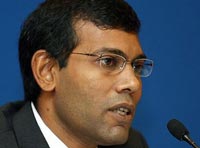President Mohamed Nasheed has announced the reforms to be proposed by the government to legislations that govern land and land transactions in the Maldives.
He made the announcement, speaking at the ceremony held in Manadhoo of Noonu Atoll today to begin transferring state held land titles in the islands to island councils.
The President said there were a number of reforms to existing land legislations and new legislations necessary to facilitate use of land as a transferrable commercial property and to ease the shortage of land in the Maldives.
The President said the government intended to propose reforms to existing Land Act and propose two new legislations on condominiums and mortgages.
On the reforms proposed to Land Act, the President said the aim of these reforms was simplifying both legal and administrative procedures in buying and selling land, and transferring ownership of land.
He said the duration that takes to conduct land transactions and the confusion involved in the process was obstacles to commerce and economic growth.
Outlining the new Condominium Bill to be sent to the People’s Majlis, the President stated that this legislation would facilitate individual ownership of pieces of real estate, usually apartment houses, housed in a single building.
He said such legislation was necessary to successfully deliver the government’s housing programme which aims to provide housing on installment basis.
The legislation would also overcome current obstacles to mortgage an apartment as the individuals do not own an apartment until they paid the price of the apartment in full.
In addition, summarizing the mortgage bill to be proposed to the parliament, the President emphasized the need enmesh the procedures for mortgaging properties and land, and the rights of the mortgagee and mortgager within the legal framework.
In his speech today, the President underscored that the severe shortage and resulting higher cost of land prevailed in the country not because of limited land but because of hindrances to transacting land.
He said the government wanted to change the way land transactions were done in the Maldives to allow easy of use of land as for commercial use, as a commercially transferrable asset.
The President said attaining national development and economic growth would not be possible without freeing land from unnecessary legal and procedural hindrances and allowing commercial transactions of land.


